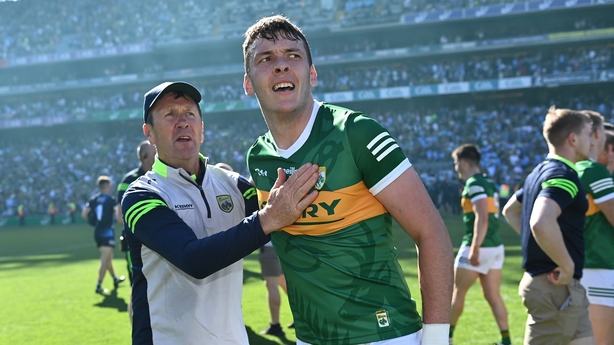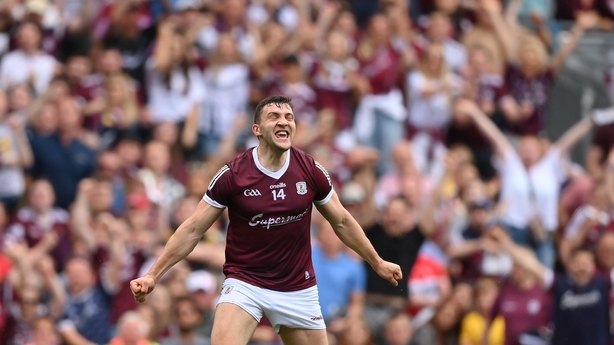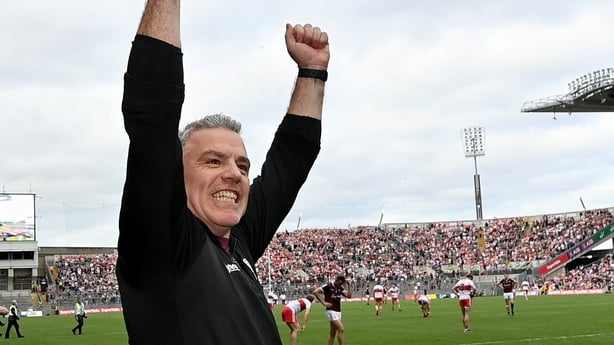It used to be a matter of pride that Kerry treated semi-final wins with cool reserve - hell, in the bountiful days, they even treated final wins the same way - but that did not apply this time around. Not against this team.
After Seanie O'Shea successfully shut out the deafening racket from the Hill to curl over a magnificent long-range free, his Kerry team-mates couldn't stop themselves leaping about in ecstasy.
So much so, they barely arranged themselves for the subsequent kick-out, instead rushing to lobby referee Paddy Neilan that there be no more time. With the clock gone past 76:00, the Roscommon official agreed.
The consensus was that the winning kick measured 53 metres in total - even more impressive in the teeth of a substantial wind.
Jack O'Connor, who labelled himself a "truculent b******s" in his 2006 autobiography, was in beaming and expansive mood in his post-match press conference, apparently determined to talk for longer and inquire the assembled reporters whether they agreed with him that we'd just witnessed an all-time classic.

"Can I ask ye this question? Was it the classic that we thought it was on the line? Like, as a battle. As two prize bulls going toe-to-toe…
"It felt on the line that it was two kind of heavyweights going at it, trading punches. That's the way it felt to me on the line. Not that I should have been getting those kinds of notions on the line…
"Every now and again, you'd say, 'Jesus wouldn't it be great to be inside in the middle of this, trading blows.'"
For whatever reason, this year's Kerry-Dublin match was shorn of the usual nostalgia-fest. The build-up was remarkably free of epic montages - "What is about Dublin versus Kerry?" - and talk of Paddy Cullen rushing back to salvage his burning cakes.
Dublin fans might claim with some justification that their side's lengthy run of wins in the fixture had sapped the rest of the country's enthusiasm for misty-eyed sentimentalism.
The Munster champions were all business, grimly conscious of their sorry recent record against Dublin, "unacceptable" according to their lights. Darragh Ó Sé, the Irish Times man in Kerry, decided the best course of action to lay it all on the line last week, declaring that a sixth successive championship defeat to Dublin could only be described as "catastrophic".
The crowd was a touch down on previous games between the pair, possibly indicative of the capital's declining enthusiasm for their team, though others will be quick to cite the cost of living.
The 73,602 attendance was the lowest for a Dublin-Kerry match since 2004, a quarter-final in a half-built Croker when the former were at a low-ish ebb.
That was all forgotten during the game. Croke Park heaved and throbbed with electricity as an epic contest reached its endgame. As Kerry-Dublin classics go, it wasn't quite the anarchic score-fest of 2013, but it topped that in terms of pressure and tension.
With Con O'Callaghan finally revealed as an absentee, Kerry appeared to have more dazzle in their forward line. Dublin's inside line of Costello, O'Dell and Rock - the latter of whom struggled to impact the game beyond kicking frees - seemed fairly unprepossessing compared to the Mannion-O'Callaghan axis of recent years.
Kerry's big-time players delivered in the first half, the biggest of them all, especially. David Clifford had six points on the board before the 40th minute, four of them from play and another a mark taken under considerable pressure.
Given the conditions, the wind blowing down towards the Canal side, there was a nagging sense that Kerry hadn't built up a substantial enough lead by half-time, that they'd left too much behind them. Clifford, in particular, seemed frustrated by their leisurely and cagey build-up play, demanding more ambitious ball early.
When the Dubs came roaring into the contest, it was their senior players to the fore, notably Kilkenny, who hit top form as the endgame arrived, clipping over three points from play as Kerry's composure wavered.
Kerry played the second half like a team labouring under intolerable pressure. Clifford's influence waned as the game wore on and he appeared to tire, leading to more questions about his fitness levels and the amount of training under his belt.
"There was three weeks to the Limerick game; he basically didn't train between the Cork game and the Limerick game," O'Connor said afterwards, trying to remember aloud.
"Em, I’m just trying to think of the timelines … he has missed a good bit of training. I’d say minimum he’s missed a month’s training in the last seven-eight weeks. He’s missed four out of the seven or eight weeks.
"So, you know, it’s a great sign of the man that he can play the way he did today, missing that much training."
"Into the wind, Hill 16, it doesn't get much tougher than that"
— The Sunday Game (@TheSundayGame) July 10, 2022
Jack O'Connor hails Sean O'Shea's winning score as he also graciously lauds the Dublin effort against Kerry #sundaygame pic.twitter.com/lNsdqYj90L
In the dying minutes, as Kerry floundered, and the momentum lay with the capital, Clifford had just enough in the tank to earn one last free, winning possession ahead of Davy Byrne before being pulled to ground. Seanie's sainted right boot did the rest.
"It feels good at the moment," observed a contented O'Connor.
"It is an ecstatic dressing-room at the moment, but we'll have to get the boys down to a level ground again.
"You can imagine the Galway dressing-room a couple of weeks ago when they beat Armagh in an epic. So, they have had a similar enough experience to us, but we have to do a lot of work on the boys in the next couple of weeks to convince them this job isn't done, this job is far from done."
At the end of it all, we have the purists' dream final.
Kerry-Galway is the kind of final to get them purring in Killarney or Cahirciveen about "true footballing counties" and whatnot. Whether this notion holds up in the present era is beside the point, these folk work off perception.
Galway's reputation is such that said purists will forgive them their part in first semi, whether their shrewd mirroring of Derry's defensive set-up for large tracts of the game or their judicious bouts of keep-ball late on. The aesthetes only have one team that they're blaming for the course the Saturday's game took.
Reading across from how Galway played when navigating the particular challenge posed by the Ulster champions into how they will play in an All-Ireland final against very different opponents would be a crudely foolish endeavour.

The infamous Hawkeye glitch prompted Padraic Joyce to briefly wade into a particularly vexed debate, observing, with a smile, that "it goes to show that technology is human too", a big statement with many deep philosophical implications although we didn't have time to get into them at the post-match presser.
Whether Hawkeye will overcome its personal difficulties in time to be of use in the upcoming All-Ireland finals remains to be seen. Either way, since Saturday, many supporters of various counties are taking the opportunity to revisit some previous close calls. (What are the chances of Bubbles Dwyer and co launching a petition this week for a full inquiry into the closing stages of the 2014 All-Ireland hurling final?)
In addition to the damage done to Hawkeye's once unimpeachable reputation, the weekend also softened the cough of one of the breakout stars of the summer - we speak, of course, of the 'fly goalie'.
Ethan Raferty has emerged as the leading prototype of this relatively new genre of player, building on the groundbreaking work of the likes of Rory Beggan. However, Odhran Lynch's adventures on Saturday will have set back the cause of the roving keeper, as wary club managers all over the country will have taken account of the sight of Damien Comer slamming the ball into a gaping net from 30 yards.
Joyce, Galway's greatest ever forward - certainly since colour televisions came in at any rate - was under significant pressure after two immensely frustrating pandemic years. The feeling in some quarters was that he wouldn't survive a third successive championship loss to Mayo, his emotional reaction at the final whistle in Castlebar in April betraying the stakes involved.
RTÉ GAA analyst Kevin McStay made clear from the off that 2022 had to be a big year for Galway. Across league and championship, Galway have won 11 from 13 games this year, the two losses coming against Roscommon, neither especially consequential - one a dead rubber game after promotion was secured and the other a high profile but ultimately ceremonial Division 2 final.

They are in an enviable position now. They have what amounts to a free shot at an All-Ireland title, with little pressure on them. Given the wealth of talent in their forward line - bottled up largely yesterday - they are highly dangerous opponents.
Back in the 2000s, when Kerry established a lengthy winning streak in the fixture, Galway supporters had cause to worry that their Munster style siblings were rather too fond of playing them. After the famous 2008 quarter-final, when the two teams served up a high-scoring classic in the rain, Pat O'Shea spent the aftermath lavishing praise on Galway for the purity and elan of their football.
Unlike the northern teams, Galway came at Kerry with an entertaining but slightly inferior brand of the same approach - reminiscent of when Arsene Wenger's Arsenal used to come up against Barcelona in their pomp. It was under Kevin Walsh in 2018, when Galway embraced the so-called dark side, that they ended their championship losing streak against Kerry.
Joyce wasn't slow to reference Galway's oft-forgotten status in the history of game after reaching a first final in over two decades.
"You look at history, Dublin and Kerry are way ahead," he said. "Galway are actually the third most successful team in football in the country. People sometimes forget that."
What we have in store now is a final rich in historical angles, as the traditionalists' favourites go head to head in a decider for the first time since 2000.


